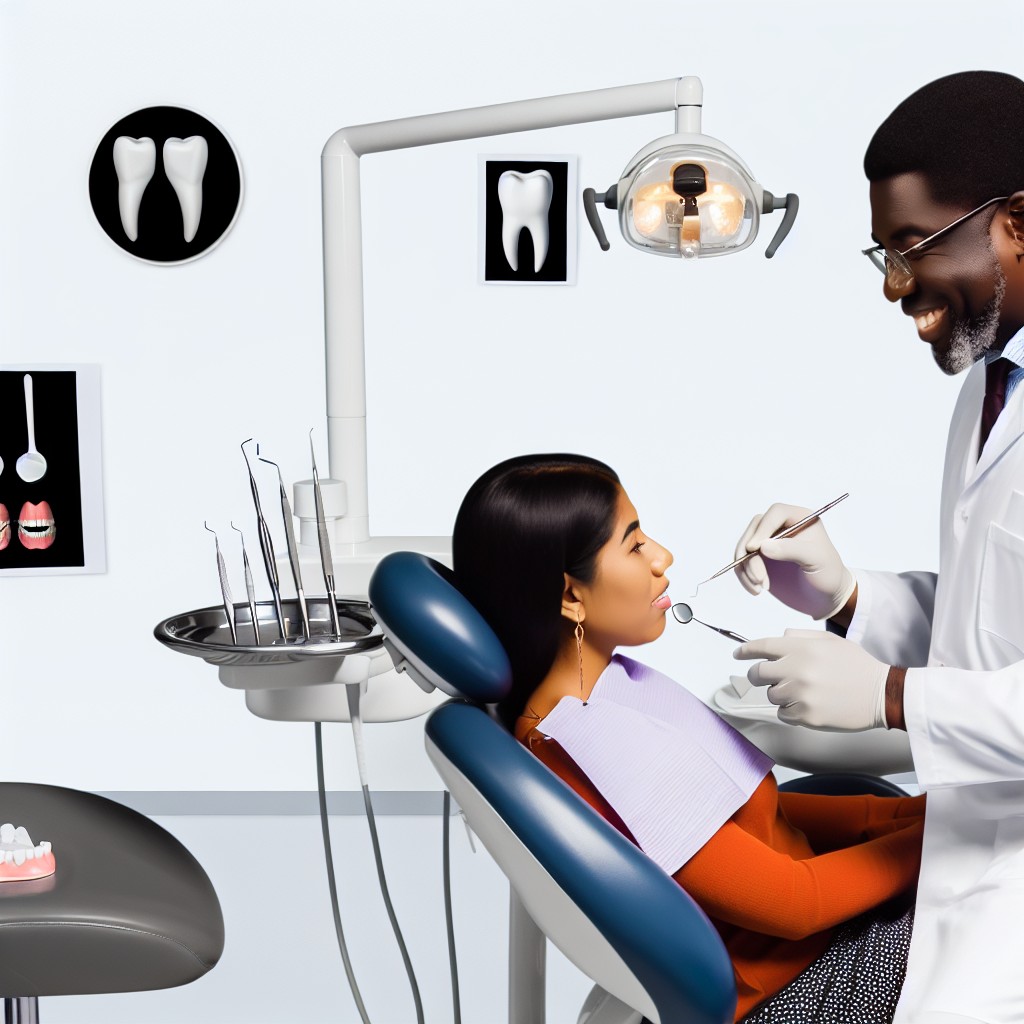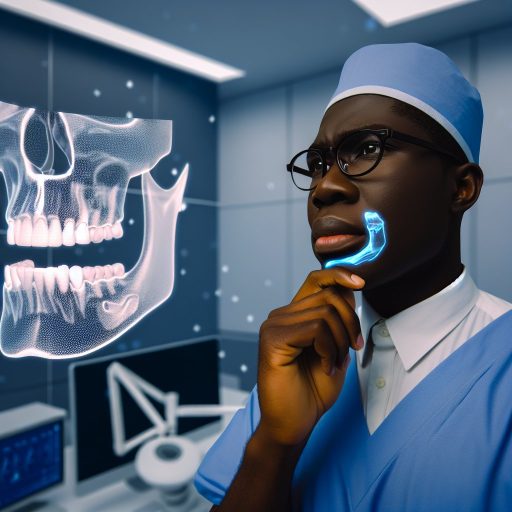Introduction:
Dental care is crucial during pregnancy for overall health.
Good oral health impacts the baby’s development.
Key tips to ensure good oral health during pregnancy include regular check-ups, proper hygiene, and a balanced diet.
Importance of oral health during pregnancy:
There is a direct link between oral health and overall health during pregnancy.
Pregnant women are more susceptible to certain dental problems due to hormonal changes.
Regular dental check-ups and preventive care can help maintain good oral health.
Common dental problems during pregnancy:
- Gingivitis: Inflammation of the gums is common due to hormonal changes.
- Periodontal disease: Pregnancy can worsen existing gum disease if left untreated.
- Tooth decay: Acid from morning sickness can lead to enamel erosion and cavities.
Benefits of preventive dentistry during pregnancy:
- Preventive care can help avoid or minimize dental problems during pregnancy.
- Regular cleanings can reduce the risk of gum disease and tooth decay.
- Early detection of dental issues can prevent complications and ensure a healthy pregnancy.
Maintaining good oral health during pregnancy is crucial for both the mother and the baby.
By practicing preventive dentistry and addressing any dental issues promptly, pregnant women can ensure a healthy smile and overall well-being throughout this special time.
Regular dental check-ups are crucial during pregnancy to maintain oral health.
Importance of Scheduling Regular Dental Check-ups
Scheduling regular dental check-ups during pregnancy is essential for several reasons.
Firstly, hormonal changes during pregnancy can increase the risk of developing gum disease.
Regular dental visits can help monitor and manage any potential issues before they escalate.
Additionally, preventive measures can be taken to avoid dental problems such as cavities and gum disease.
Early detection and treatment of dental issues are vital to prevent complications that could harm both the mother and the baby.
How Preventive Measures Can Help Avoid Dental Issues
Preventive dentistry focuses on maintaining good oral hygiene and addressing potential problems before they worsen.
During pregnancy, preventive measures such as regular cleanings, fluoride treatments, and dental exams can help prevent gum disease and cavities.
These preventive measures are safe for pregnant women and can significantly reduce the risk of developing dental issues that could impact both maternal and fetal health.
Tips for Finding a Dentist Experienced in Treating Pregnant Women
- Ask for recommendations from your obstetrician or other healthcare providers.
- Look for a dentist who has experience in treating pregnant women.
- Ensure the dentist uses safe practices and equipment suitable for pregnant patients.
- Discuss your pregnancy with the dentist and any concerns about dental treatments.
Explore Further: Common Child Dental Issues in Nigeria
During pregnancy, hormonal changes can have a significant impact on oral health.
Effects of Hormonal Changes on Oral Health
- Increased levels of progesterone and estrogen can lead to gingivitis.
- Gingivitis is characterized by red, swollen, and tender gums.
- These hormonal changes can also cause pregnancy tumors in the gums.
- Pregnancy tumors are non-cancerous growths that bleed easily.
Common Dental Issues During Pregnancy
- Gingivitis is one of the most common oral health issues during pregnancy.
- Pregnancy tumors, although benign, can be uncomfortable and unsightly.
- Increased risk of cavities due to changes in diet and oral hygiene habits.
Tips for Managing Hormonal Changes
- Practice good oral hygiene by brushing and flossing regularly.
- Visit your dentist for regular cleanings and check-ups during pregnancy.
- Eat a balanced diet rich in calcium, vitamins, and minerals for strong teeth.
- Stay hydrated and avoid sugary snacks to prevent cavities and gum disease.
- If you have gingivitis or pregnancy tumors, seek treatment from your dentist.
- Inform your dentist about your pregnancy and any changes in your oral health.
By following these tips and maintaining good oral hygiene, you can prevent dental problems associated with hormonal changes during pregnancy.
Gain More Insights: Introduction to Preventive and Social Medicine in Nigeria
Oral Hygiene Tips for Pregnant Women
During pregnancy, it is essential to prioritize oral health to ensure the well-being of both the mother and the baby.
Here are some oral hygiene tips for pregnant women to follow:
Maintaining Good Oral Hygiene
- Brush your teeth at least twice a day with fluoride toothpaste to remove plaque and prevent cavities.
- Use a soft-bristled toothbrush to avoid irritation of the gums, which may be more sensitive during pregnancy.
- Don’t forget to floss daily to clean between your teeth and along the gumline where a toothbrush can’t reach.
- Rinse your mouth with water or mouthwash after brushing to help reduce bacteria and freshen your breath.
Importance of Brushing and Flossing Regularly
- Brushing and flossing regularly is crucial during pregnancy to prevent periodontal disease and maintain overall oral health.
- Pregnant women are more susceptible to gum inflammation and gum disease due to hormonal changes in the body.
- Untreated periodontal disease can lead to complications such as preterm birth and low birth weight, emphasizing the need for proper oral hygiene.
- Regular dental check-ups and cleanings can help detect and treat oral health issues early, reducing the risk of complications.
Recommendations for Safe Dental Care Products
- Choose toothpaste that contains fluoride to strengthen enamel and protect against tooth decay, but avoid excessive ingestion of fluoride.
- Look for dental care products that are specifically formulated for pregnant women and are free from harmful ingredients.
- Opt for a toothbrush with soft bristles to prevent gum irritation and damage to tooth enamel while effectively cleaning teeth.
- Consult with your dentist or healthcare provider for recommendations on safe dental care products and practices during pregnancy.
By following these oral hygiene tips and recommendations for pregnant women, you can maintain good oral health throughout your pregnancy.
This will reduce the risk of dental issues that may affect both you and your baby.
Remember that oral health is an essential part of overall health, especially during this crucial time.
You Might Also Like: Biomedical Technology Certification in Nigeria
Nutrition and oral health:
Proper nutrition is crucial for maintaining good oral health during pregnancy.
Consuming foods rich in vitamins, minerals, and antioxidants can benefit dental health.
A pregnancy-friendly diet that supports oral health includes the following tips:
Eat a balanced diet:
Include a variety of fruits, vegetables, whole grains, lean proteins, and dairy products.
Choose foods that are low in sugar and limit consumption of sugary snacks and beverages.
Increase calcium intake:
Calcium is essential for strong teeth and bones, so consume dairy products, almonds, and leafy greens.
Consider taking a calcium supplement if recommended by your healthcare provider.
Stay hydrated:
Drink plenty of water throughout the day to keep your mouth moist and wash away food particles.
Avoid sugary drinks and opt for water, herbal teas, or milk instead.
Choose teeth-friendly snacks:
Opt for crunchy fruits and vegetables like apples, carrots, and celery that can help clean teeth.
Avoid sticky, sugary snacks that can contribute to tooth decay.
Consider vitamin supplements:
Consult with your healthcare provider about taking prenatal vitamins that include essential nutrients for oral health.
Ensure you are getting enough vitamin D, C, and B vitamins to support gum health and prevent oral health issues.
Transform Your Career with Expert Guidance
Get personalized mentorship consulting that’s tailored to your unique path. Our expert advice is actionable and exclusive.
Get StartedPractice good oral hygiene:
Brush your teeth twice a day with fluoride toothpaste and floss daily to remove plaque buildup.
Visit your dentist for regular check-ups and cleanings to monitor your oral health during pregnancy.
By following these tips and maintaining a nutritious diet, you can support your oral health during pregnancy and reduce the risk of dental issues.
Remember, what you eat not only affects your overall health but also plays a significant role in your dental well-being.
See Related Content: Common Parasitic Diseases in Nigeria

Potential risks of dental treatments during pregnancy:
- Common concerns about getting dental treatments during pregnancy
- Safe treatment options for pregnant women
- Guidelines for handling dental emergencies during pregnancy
It’s essential for pregnant women to maintain good oral health during pregnancy.
However, many are concerned about the potential risks of dental treatments.
Understanding these risks and knowing how to address them is crucial for the health of both the mother and the baby.
Addressing common concerns:
One common concern among pregnant women is whether dental treatments can harm the developing fetus.
While some dental treatments involve minimal risks, others may pose potential dangers, especially during certain stages of pregnancy.
For example, X-rays are typically avoided during the first trimester when the baby’s organs are developing.
However, if necessary, your dentist can take precautions to minimize radiation exposure and ensure the safety of the baby.
Another concern is the use of anesthesia and medications during dental procedures.
Some medications may not be safe during pregnancy, so it’s essential to inform your dentist about your pregnancy before any treatment.
Your dentist can recommend safe alternatives or postpone treatment if necessary.
Safe treatment options for pregnant women:
Fortunately, many dental treatments can be safely performed during pregnancy.
Routine cleanings, fillings, and even minor procedures like root canals can usually be done without any risk to the baby.
It’s essential to inform your dentist about your pregnancy so that they can take the necessary precautions.
Your dentist may recommend delaying non-urgent treatments until after the baby is born to minimize any potential risks.
If you require more extensive procedures, such as extractions or oral surgery, your dentist may consult with your obstetrician to ensure the safety of both you and your baby.
With proper communication and planning, most dental treatments can be safely performed during pregnancy.
Handling dental emergencies during pregnancy:
Dental emergencies can occur at any time, including during pregnancy.
If you experience severe tooth pain, swelling, or other dental issues, it’s essential to seek treatment promptly.
When facing a dental emergency during pregnancy, it’s crucial to inform your dentist about your pregnancy.
They can advise you on the best course of action and ensure that any necessary treatments are safe for both you and your baby.
If you require emergency dental treatment, your dentist will take extra precautions to ensure your safety.
They may adjust the treatment plan or use alternative methods to minimize any risks to the fetus.
By following these guidelines and communicating openly with your dentist, you can maintain good oral health during pregnancy while minimizing any potential risks to your baby.
Remember, a healthy mouth is essential for a healthy pregnancy!
Importance of Communication with Healthcare Providers:
- Informing healthcare providers about pregnancy status is crucial for tailored care.
- Pregnancy can affect dental treatment plans due to hormonal changes and sensitivities.
- Coordinating dental care with prenatal care can enhance overall health outcomes.
Communication with healthcare providers during pregnancy is essential for ensuring the well-being of both the mother and the baby.
By informing healthcare providers about the pregnancy status, women can receive specialized care that meets their unique needs during this critical time.
This is particularly important when it comes to dental care, as pregnancy can have a significant impact on treatment plans and oral health.
When it comes to dental treatment during pregnancy, there are several factors to consider.
Hormonal changes during pregnancy can increase the risk of developing gum disease, making regular dental check-ups and cleanings especially important.
Additionally, pregnant women may experience increased tooth sensitivity and a higher risk of cavities due to changes in their diet, oral hygiene habits, and hormonal fluctuations.
Tips for Coordinating Dental Care with Prenatal Care:
- Schedule a dental check-up early in pregnancy to address any existing issues.
- Inform your dentist about your pregnancy and any medications you are taking.
- Discuss the timing of elective procedures with your obstetrician to ensure safety.
- Brush and floss regularly to prevent gum disease and cavities.
- Consider using a fluoride mouthwash to strengthen tooth enamel.
Coordinating dental care with prenatal care is essential for maintaining good oral health throughout pregnancy.
By scheduling a dental check-up early in pregnancy, women can address any existing dental issues and prevent potential complications.
It is important to inform your dentist about your pregnancy and any medications you are taking to ensure safe and effective treatment.
Elective dental procedures should be discussed with your obstetrician to determine the best timing for treatment.
While emergency dental procedures can be performed during pregnancy, elective treatments should ideally be postponed until after delivery to minimize potential risks to the baby.
Brushing and flossing regularly, using a fluoride mouthwash, and maintaining a healthy diet can help prevent gum disease and cavities during pregnancy.
Communication with healthcare providers and proper coordination of dental care with prenatal care are essential for promoting oral health and overall well-being during pregnancy.
By following these tips and staying proactive about dental hygiene, pregnant women can ensure a healthy smile for themselves and their little ones.
Importance of Preventive Dentistry During Pregnancy
Preventive dentistry during pregnancy is crucial for maintaining oral health.
Regular dental check-ups, proper oral hygiene practices, and a balanced diet are essential.
Pregnant women should prioritize their dental care to prevent oral health issues that could affect both themselves and their babies.
Dental issues can lead to complications during pregnancy, such as preterm birth.
It is important to consult with your dentist about any concerns or questions you may have regarding your dental health during pregnancy.
Your dentist can provide personalized advice and treatment options tailored to your specific needs.
Remember, a healthy mouth leads to a healthy body, and it is especially important during pregnancy.
Take care of your oral health to ensure a smooth pregnancy and delivery.
For additional information on oral health during pregnancy, you can visit reputable websites such as the American Dental Association (ADA) or consult with your healthcare provider for recommendations.
Additional Resources
Enforcement Guidance on Pregnancy Discrimination and Related …




